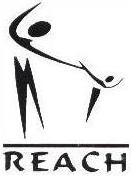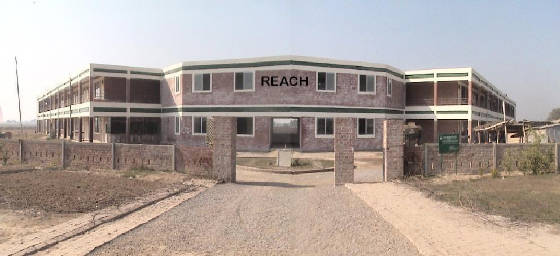|

REACH SCHOOL SYSTEM
REACH is making a modest effort in providing the opportunity of better educational and health facilities to the rural
community of Billinawala Khu, on the outskirts of the city of Lahore, Pakistan.
Though not far from Lahore, the area is typical of an under-developed rural society with deep rooted traditional practices,
with small land holdings, and with the majority of the population forming the unskilled labour class, living from hand to
mouth. Children (especially girls) are expected to lend a helping hand in house work and in the field or tend to the few farm
animals that some families possess, rather than go to school. There are only six primary/ middle schools of two/ three rooms
each and only one high school for boys with four class rooms, serving the area. Science subjects are not taught in the high
school because of non-availability of teachers. Besides insufficient infrastructure to accommodate all the children of the
community, the furniture is inadequate and in a dilapidated condition. There is huge deficiency of staff and even the posted
teachers are mostly untrained and usually absent.
The concept of education at REACH is different from traditional schools. Because of the poor standard of education
in the country and shortage of jobs for plain graduates, we at REACH decided not to further burden the already saturated ‘semi-educated
job seekers’ market’. In addition to academic education, we at REACH have a vocational training programme for
our students. There are two skill levels of our vocational training programme. Those students who are unable to pass matriculation
or do so in low grades are put through skills that do not require much intellect or academic knowledge (auto/tractor mechanics,
electricians, masons, carpenters, plumbers etcetera). Those who do well in matriculation, but not good enough to get admission
in college attend higher level of vocational training like computer operation, technical assistants, junior managers, etcetera.
Thus any child of REACH, upon leaving the institution, would be equipped to earn a living for himself.
The construction activity
was started in 2004. The initial plan was to have a block of 8 class rooms. However, when financial support was promised by
philanthropists, the project was expanded to 2 blocks of 16 class rooms each ( one for boys and one for girls.) An office
block was added later on which also has laboratories and library on the upper floor. A large play area caters for the physical
needs of the students, an important aspect of the development of the student’s personality. The medium of instruction
is English. The Punjab board syllabus is followed supplemented by some additional books for
English.
Students were enrolled in 2005 even while the construction was still in progress. Teachers
were employed from Lahore city since educated persons were
nowhere to be found in the vicinity. An Army colleague volunteered to be the principal. He used to drive the teachers van
himself and collect teachers enroute – just to save on the cost of hiring a driver. Hats off to him for fathoming through
the teething problems with patience and endurance. His dedication to the project and the children can be judged from the fact
that on finding the children under-nourished, he started lunch for them and used to personally go for purchases from the wholesale
market, to save on the costs. May ALLAH SUBHANAWATALA reward him for his dedication to the project (Ameen). Today, by the
Grace of ALLAH, there are 450 students in classes from prep to seventh, half of whom are girls. The students are very eager
to learn. Daily attendance is over 90 percent. The figure would go upto 800 when
the classes reach upto matriculation (equivalent of tenth grade or ‘O’
level) by 2010.
REACH School System has been a blessing for the community. There has been a marked change in the outlook of
the children. The uncouth, abusive child has been transformed into a well behaved and neatly dressed student who has respect
for elders. These children appear no different from the city dwellers.
The non-availability of
qualified teaching staff is a big issue for the school, which, in fact is a national problem. Educated girls have been employed
who travel daily from Lahore in school transport, which helps
to overcome this deficiency to some extent. Teachers’ training courses are run regularly to train the local semi-educated
youth as well as to improve the teaching skills of the school faculty. Educated youth of the area (matriculation and higher
qualification) is encouraged to attend the teachers training program and those found suitable are employed as junior teachers
at the end of the training. A stipend
of Rupees 1000 is given to each participant. As a result of dedicated efforts of the principal, seven local girls have been
trained and are being given further on the job training as assistant teachers.
Religious
Training
The aim of religious education at REACH is to enable the students to read and understand the Quran. It is being conducted
in two phases:
· Phase 1: Students will be able to read the Quran in Arabic by the time they finish class 5.
· Phase 2: Re-read the Quran with meanings in urdu; to be completed before finishing class 10.
‘ALHAMDOLILLAH’, The school has come a long way since its inception two years ago. The teachers are motivated
keen to teach and the students are eager to learn. We hope that with this spirit, our school will soon find a place amongst
the good schools of the country.

Response
of Students.
Admissions were opened
in April 2005. Keeping in view the fact that children of the area had poor educational background, it was decided to keep
the enrolment upto class six only. The initial response of the local people towards the school was very cautious, due to assumed
financial implications and social inhibitions. However, once the ice was broken, the flood was difficult to stop. the first
165 admissions were made in two days. In August the number had swelled to 360 and further admissions were stopped. Fresh admissions
were done in April 2006 for the new academic year and the school strength has now gone over 500 including 47% girls.
Lieutenant
Colonel Masud Amin is the principal of the school. He got commission in the Pakistan Army in 1971 and joined the Armoured
Corps. He had a teaching assignment at the Pakistan Military Academy,
which gives him a rich experience in the art of teaching.
Background
of Students
In the beginning the students
cloud not converse with the teachers because the Punjabi language of the teachers was different from the local dialect. The
smaller children failed to respond to their names till a local employee called out a child by his pet name and the trick caught
on. The analysis of the intake showed the following:-
Strengths
-
They were eager to learn, even though somewhat slow.
-
Ready to accept change for the better.
-
They had fewer distractions compared to their urban counterparts.
-
Physical agility was generally good.
Weaknesses
-
About
25% were dropouts from local schools. The others knew very little.
-
They
had no idea about English Language.
-
The
students could not even write Urdu.
-
The
picture was equally bleak for Mathematics. Only two students could count
the numbers up to ten in English.
-
Most of them made calculations from the opposite end, instead of starting from unity. Division and fractions were unknown commodities.
-
General awareness was very poor.
-
Majority of the students were psychologically suppressed and withdrawn.
-
Hygienic concepts were non-existent. Scabies was rampant.
Education
Plan
Given these special circumstances,
a shift from the routine teaching methodology was necessary. The main points of the strategy evolved were as follows:-
-
Full
day school, allowing more time for homework under supervisor.
-
Build
a base for English medium education in the first three months.
-
Develop
Reading skills and comprehension in the remaining time.
-
Concurrently
develop oral language skills, progressing to normal conversational
ability in the third year.
-
Simultaneously
develop the skill to write legibly.
-
Enhance
listening with the use of selected English films on video.
-
In
the second year, develop proper writing skills alongwith basic understanding
of grammar and sentence formation.
-
In
the third year all the language skills shall be polished to achieve the full capability in usage.
-
Provide
a friendly school environment for proper psychological development of students encouraging self-discipline.
Results
Reading ability in English
and Urdu has been developed during the year; comprehension has also improved but it is slow. Writing skills have yet to be
developed, but the vocabulary is being slowly build up.
Sports
It was not possible to
devote time to sports, however, two/three periods per week were given to physical training. Cricket matches were also organized
between houses and awards were given to the winning team. Annual sports day was held in which some athletic competitions were
organised.
Vocational
Training
The vocational and technical
training has been planned in collaboration with Punjab Vocational Training Institute. A separate block of ten classrooms is
under construction. Classes in dress making, computer education and repair of home appliances have already started and a number
of additional disciplines are being considered, including the crafts required in the building industry, and automotive repairs.
|
 |

|

